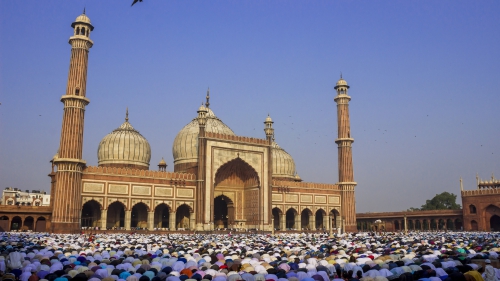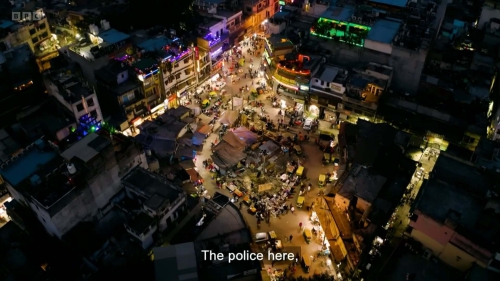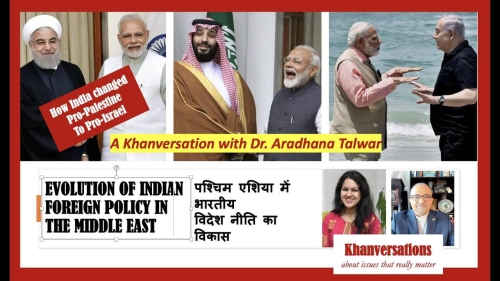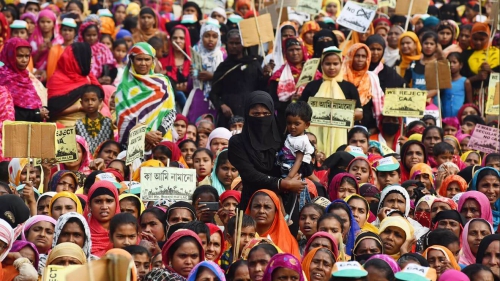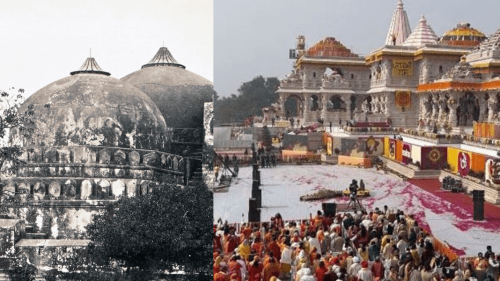Delhi Diary: Famous writer, poetess, Kamala Das chooses Islam.
Famous writer and poetess Kamala Das, who has quite a few honorary doctorates to her credit, sprang a surprise by announcing her decision to embrace Islam. Applause as well as criticism came from all directions.
In an interview to the Times of India on December 15, she threw down a gauntlet to the champions of women's emancipation and empowerment, by declaring that it was purdah (Hijab, or more accurately Niqab) which appealed to her the most. "I like the purdah which Muslim women wore. I like the orthodox lifestyle of Muslim women," she said in no ambiguous terms. "Purdah is a wonderful dress. No man ever makes a pass at a woman in purdah. It provides her with a sense of security."
To Dr. Surayya (her new adopted name), purdah grants protection. She is not in need of the freedom that the Western culture wishes to grant the women -- along with lustful eyes. At a recently held book fair in Delhi, semi-nude female models were installed as statues so as to attract and allure more and more visitors. What a shame! Women's bodies have, even in India, become a tool to popularize products.
People who are spearheading a ceaseless battle against the advocates of purdah to "emancipate the woman" in order that she may "march with the times" do so by exposing her body to the vulgar gaze of strangers.
Speaking about freedoms that liberation offers, Dr. Surayya is quite candid: "I don't want freedom. I had enough of it. Trust me. Freedom had become a burden for me. I want guidelines to regulate and discipline my life. I want a Master to protect me. I want protection and not freedom. I want to be subservient to Allah. In fact, for the past 24 years I had worn purdah off and on. I had gone to markets, matinee shows and even while abroad I had worn purdah. I have several of them. A woman in purdah is respected. No one touches you or teases you if you wear one. You get total protection," she said.
In a society, where harassment of women is on the increase, molestation in offices goes unabated, where promotion of female employees increasingly depends on sexual compromise, where rape incidents are taking an alarming trend, what a woman really needs is protection.
"Now let us consider freedom," continued Surayya. "The tenets of Islam offer full freedom to women. They are treated with equality. Curbs on freedom are there only in those societies where these tenets are ignored. I don't consider a woman's submission to her husband and other higher powers as lack of freedom. I've had enough of such freedom and I don't want it any more. I have totally submitted myself to Allah. I am happy to observe His rules and conditions."
According to her, Islam is the only religion that truly recognizes the dignity of women. She had not found that in the Hindu religion in which she was born.
Dr. Surayya took 27 years to make up her mind to finally embrace Islam. Her consultation with her husband in the early seventies and his thoughtful advice to her to read more about Islam points to a healthy understanding between both of them. Neither her husband nor children pressured her to reverse her course. Rather, they extended a helping hand.
Her three sons have all joined her in the town of Kochi (South India) to support her in view of the threats made by fanatics. "We have no disagreement with her decision. She is our mother whether she is a Hindu or Christian or Muslim. We would be with her all the time," said one of her sons.
"They say if it pleases me, they too are ready to change their religion," Dr. Surayya discloses about her sons.
Dr. Surayya has totally ignored threats. "I have left everything to Allah. He will protect me to the last," she said. Her son, Mr. M. D. Nalappad, former editor of Mathrubhumi and former resident editor of the Times Of India in Bangalore, said that they received a number of threatening telephone calls, apparently from Hindu extremists. One caller threatened to kill her within 24 hours.
The support, love and compassion coming from the Muslim community overwhelmed her. "My feeling that Islam is a religion of love and compassion has been proved right. I have been getting calls from almost all the Muslim countries extending support to me ... My next foreign trip will be to Makkah. I want to kiss the soil in Madina," she said in another interview.
There have been some ludicrous allegations in the press that she was taking away the Hindu god Krishna from the Guruvayoor temple to make him Muhammad.
History stands as testimony to the fact that Islam was never spread by forcible means. Since Independence of India, thousands of people have embraced Islam without any compulsion. Rather, attempts were made and measures were taken to prevent people from accepting Islam. The threats to Dr. Kamala Das are not new happenings, but whosoever dares to abandon one's birth religion to embrace Islam has to confront them.
What brought Dr. Das to Islam was her desire to teach two blind Muslim children, Irshad Ahmed and Imtiaz Ahmed. She had to study Islamic scriptures before teaching them. One of them is now a professor in Darjeeling (Northeastern India) and the other is an attorney in London.
She plans to write poems on Allah. "Allah is the fountainhead of love and compassion," says Surayya. "I will write about that. I have already written three poems on Allah. I will write more soon and bring out a compilation before the end of next year."
She is against the Hindu practice of cremating the dead. "I do not want my body to be burnt. I do not want my successors to offer pindam (a ritual) and believe that after death, I will re-appear in the form of a crow," she asserts.
She also plans to learn more about the Qur'an and about the things that a good Muslim is expected to do. "I understand that a good Muslim should help others. I have been doing so and I am keen to continue it," she says. "I don't want to keep money. I want to give part of what I have earned to others. I would like to make this the religion of the new millennium. I will tell people the virtues of this religion and share the happiness I experienced after embracing Islam. I have no words to explain the contentment I feel now. I have never felt such happiness in my life. I feel loved and protected. I am an old person. I want this love and protection. Money cannot bring such happiness. I don't want money."
A Profile of Dr. Kamala Das
Dr. Surayya was born in Kerala. Her mother was a famous poetess. Her father, Mr. V. M. Nair was the Managing Editor of two journals, Mathrubhoomi and Nalappat Balamani Amma. Her late husband, Mr. Madhava Das was a Senior Consultant for International Monetary Fund (IMF).
She had served as the Poetry Editor of the Illustrated Weekly of India, as the President of Kerala Children's Film Society, as chairperson of Kerala Forestry Board, and as the Orient Editor of Poet Monthly.
In addition to her numerous prominent works in Malayalam language, her works in English have also been honored. Summer in Culcutta, Alphabet of the lust, The Descendants, Old Play House and Collected Poems are some of her acclaimed works.
Ente Katha, written in Malayalam, has been translated into 15 foreign languages. One of her works received the Kerala Sahitya (Literary) Academy Award for short stories in 1969.
She was awarded Asian Poetry Prize in 1964 (for The Sirens), Kent Award in 1965 (for Summer in Calcutta), and Asan World Prize and Academy Award (for Collected Poems).







